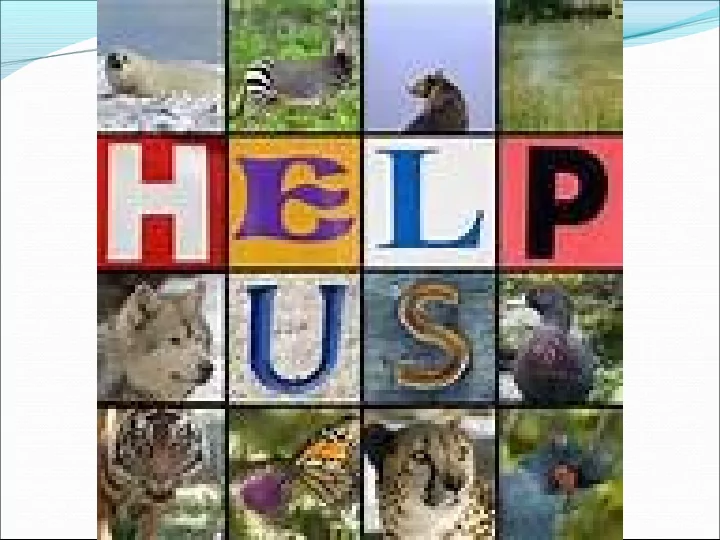

Human Centered Ethics Duties: Not to allow the natural environment to deteriorate Responsibility: To protect Wilderness Obligations: Link the plants & Animals with Human Values
Life Centered Ethics Biocentric Equality To link with the past for our future generation Long term Values Wilderness As World Heritage
Balance in Nature Harmonious and Steady Equilibrium Human Living and Biotic Community Reverence of life Future Generation
Cruelty to Animals Inflict pain on animals, torture them … kill them Animals are raised for foods Used in our Research, product testing, .. Hunting and fishing Sports and Entertainment The Mode of mass production and mass consumption
Impact Human health Biodiversity Environmental Quality
The Status of Animals in Western Tradition Culture of Anthropocentrism Human are regarded superior to other life forms and inanimate objects. Judeo-Christian Tradition Greek Philosophy – Humans are rational and linguistic beings. Value is determined by the notion of ‘unique function.’
The Bible (Genesis 1:2) God gave human “dominion” over the rest of creation “And God blessed them: and God said unto them, Be fruitful, and multiply, and replenish the earth, and subdue it; and have dominion over the fish of the sea, and over the birds of the heavens, and over every living thing that moveth upon the earth” (cf. Gunn, “Animal Ethics”, p.11)
Use of animals Food Agriculture Transport ‘The hierarchy manifests in various kinds of exploitation such as slavery, sexism, racism, and colonialism as well as the treatment of animals and nature.’ (Alastair S. Gunn, Green Ethics and Philosophy, SAGE, London, 2011, p.11)
Human and Animal Relations Human see the animals as fit to use No direct duties to animals “Humans may nonetheless have duties not to mistreat animals. … we have duty to respect property rights, and therefore not to harm animals that are someone’s property.” (Ibid.)
Duty of the humans Duty is owed to the owner, not to the animals itself. Cruelty to animals should be discouraged.
Challenges within the Tradition Pythagoras (c.570- 490 B.C.E) advocates vegetarianism Soul undergoes successive reincarnation (metempsychosis), which can include reincarnation of animals Jean Jacques Rousseau (1712-78) and Jeremy Bentham (1748- 1832) Animals are incapable of reason Sentience beings suffer/ infliction of suffering was opposed by Bentham Charles Darwin and Rousseau advocated that animals are capable of human emotion and feelings
The Modern Animal Ethics Movement Henry Salt’s Animal’s Right: Considered in Relation to Social Progress (1892) Salt argued for vegetarianism and end of vivisection (dissection of living animals) Blood sports, and killing animals for skin, fur and feathers Geroge Bernard Shaw (1856-1950) Peter Singer (1946--) Demand for identical treatment of animals and vegetarianism
Peter Singer Animal Liberation: A New Ethics for Our Treatment of Animals (1976) Preference Utilitarian What is utilitarianism? “All forms of utilitarianism define the right action as whatever will produce the best outcome for all affected but they differ about the of ‘the good.’
Preference Utilitarianism “Whatever maximizes the satisfaction of the preferences involved, which may not necessarily be their own happiness.” Acceptance of women, ethnic minorities are equal to those of males….(?) Animals used for the gratification of pleasure Dog fighting, cockfighting, … (Religious Sacrifices in India) Developing economy always put demand for animal products… profitably produced.
Peter Singer We should cease to treat animals in ways that cause them to suffer. To use them for food is inflict suffering on the animals. “The medical research using animals offer potential benefits to humans (though the pay off rate is low), much research is into conditions that suffers bring upon themselves by choosing unhealthy or high risk lifestyles.” (p.13)
Singer continues…. “Other conditions such as diseases caused by environmental pollution and unhealthy working places could be avoided by changing industrial practices, waste generation and management, and transportation policies.” (p.13)
Recommend
More recommend